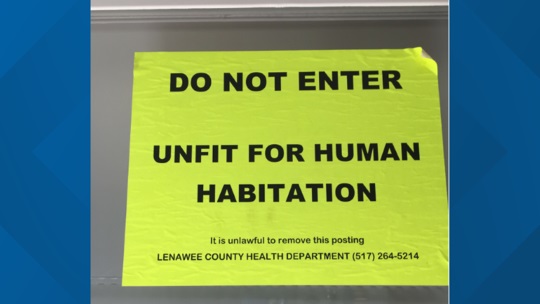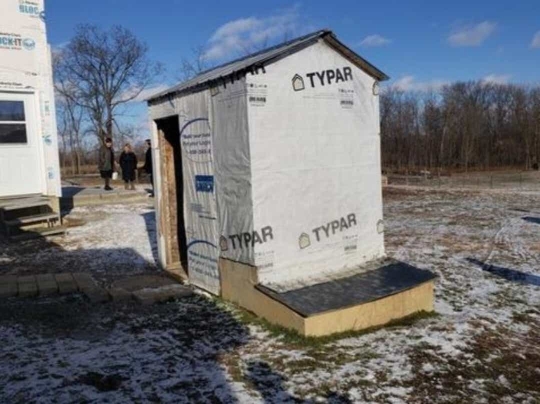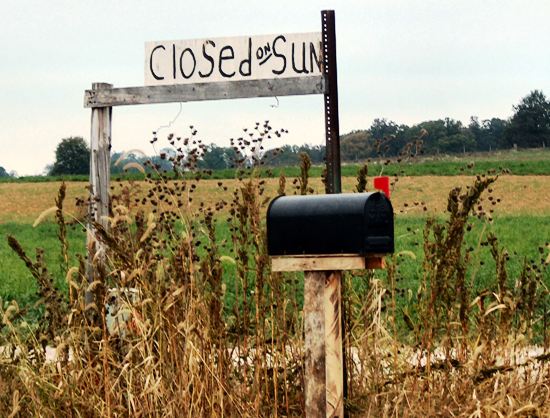ACLU Sues To Stop Michigan County From Demolishing Amish Homes
In August we learned that a Michigan county had deemed Amish homes “unfit for human habitation.”
The reason? Outhouses and lack of running water, which created what were described as unsafe living conditions.

Photo by Mary Speer/WTOL
Eviction loomed, and jail and fines were possible. There was even a threat of the homes being bulldozed.
Now the Lenawee County Health Department has been sued by a team of attorneys representing 14 Amish households, as reported in the Toledo Blade.
The purpose is “to halt Lenawee County officials from demolishing Amish family homes.”
The American Civil Liberties Union of Michigan is helping a private Ohio law firm in this case. They assert discrimination by the health department towards the Amish.
Amish did not want to sue at first. They changed their minds when they realized their homes might be destroyed. The lawyers here are working pro bono.
We hear from an older Amish couple on how the experience has affected them:
The husband and wife that agreed to speak on the record, ages 68 and 66, respectively, said they moved to rural Lenawee County in 2016 because they needed more living space for their six children, ages 23 to 46, and their families. The couple, married in 1972, said it has 30-plus grandchildren.
“If we allow modernization to come in, we won’t be holding up our religion,” the husband said, explaining that he doesn’t want God thinking less of them.
He said he tried to get an explanation from county officials.
“I asked them if they had no respect for religion,” he said. “We’d like to live a plain life and be left alone by the health department. I don’t think we’re harming anybody.”
The man said the ordeal has woken him up at night. His wife said she and other Amish residents are scared now when they see automobiles drive up on their property, fearing it is a county official.
Richard Schulte, of the Ohio law firm, worked on a similar case in Ohio. That one was resolved when Amish agreed to treat their waste before using it as fertilizer.
Schulte considers this case and the County’s actions “much more aggressive and offensive.”

Outhouse in the community. Photo by Spencer Durham, The Daily Telegram
Schulte believes the local water is safe, and that he did not know if the county had tested groundwater.
Installing modern septic systems would require electricity and technology which these Amish find objectionable.
Is this a danger?
Schulte and the ACLU argue that this is a key case in the matters of religious freedom and fair housing.
On the other hand, the County in a release said this is a public health issue, and that it has a responsibility to protect all residents of the county:
“The requirements for these property owners are the same requirements that apply to all other residents of Lenawee County,” the release states. “The requirements of the Lenawee County Environmental Health Code, to supply clean water and properly dispose of sewage, are in place to protect the public health of all citizens of Lenawee County.”
The issue arose several years ago following complaints by residents over the outhouses.
Officials stated that they created a hazard both for those living on the properties, and for others on nearby properties.
Is this a real threat? And if so how great is it?
I haven’t seen much analysis of that, and if Schulte is correct, no water testing has been done to assess conditions.
For what it’s worth, a commenter on the article suggests that when properly constructed, an outhouse system is not a danger:
Outhouses are acceptable solutions in Alaska, rural areas, and other countries. As long as the hole is dug deep enough and is away from wells, etc., it is not a problem.
I think this matter ought to hinge on that question – is there a danger created by this, and is the risk unacceptable?
It’s also possible the outhouse issue is simply the chosen battle point for residents who have other issues with the Amish in the county.







Outhouses a danger?
Wildlife pees and poops everywhere in nature, yet we somehow survive. I hope a reasonable settlement agreement can be reached. I’m not a big fan of the ACLU, but, in this case, perhaps they can help.
BIG FAN
I am a big fan of the ACLU and the Amish are fortunate that they are taking up their cause.
ACLU
it is time people understand that this is NOT hamster poop. We all know for a fact that they do not realize the harm they could create for themselves and neighbors…they could be pumping it right back out of the ground and into the water they drink ?
teach the children well
Gentrification
The problem of septic non-conformity could be easily fixed with the use of composting toilets. These units have been proven to be safe, eco-friendly, cost effectve and would not go against Amish values.
Evictions and bulldozers are not the solution unless the aim is to clear out the area for more profitable residents (gentrification).
I will pray for the pro-bono lawyers representing these Amish families.
God bless them!
Overreach
This case is a classic example of government overreach. Shame on your local building inspector.
Business as Usual...for the English
And, the business referred to happens to be: harass the Amish to the point where they leave. Just a relatively short time ago in southern Illinois many English farms relied out houses and wells…and nobody complained. It’s my belief that the Lenawee housing inspectors have an ulterior motive in their persecution of the Amish. The Amish are God fearing and loving anabaptists and not evangelical, money and material loving Christians like the English who badger the life out of those who do not conform to their conception of Christianity. I’m willing to bet that those English who have taken it upon themselves to “get rid of the Amish,” were sure that the Amish would never sue the county. They certainly got fooled this time. It does my little heart good to hear that a law firm and the ACLU have come to the rescue of some of the best people on earth!
suggestion
install a double tank waste system. with gravity feed.for liquids and solids.
Extend a “Breeze Way” between the “out house” and the house. Then, it would no longer be out.
a Hand pump would provide water into a house.
We did this at the cabin up north from there and it circumvented our county
officials.
We learned that due to the constant use of yeast in baking bread kept our sewer clean.
Ridiculous
Has anybody saying this been camping in rural campgrounds? Many have outhouses. Real outhouses. Can’t the government let anybody live in peace? They’ve been living like this for ages, now suddenly it’s not acceptable? Maybe they think they can get the land cheap and sell hi
Leave the Amish alone
Back in the day, everyone had an outhouse and had to pump their own water. I live in Northern Wisconsin and we still have an outhouse. We also have modern conveniences in the house. The outhouse is available when we work outside. If the Amish are looking for a new place to live, we would open them with open arms. If anyone up here we’re to harass the Amish, they will have to deal with me. Please leave the Amish alone, Lenawee county, you should be ashamed of yourself. Everyone should boycott that county.
Bureaucracy
Love or hate ACLU, it endeavors to make law serve everyone fairly. These folks may not want to use the legal system but due process is the only way to prevent arbitrary enforcement. If in the course of getting their due process their outhouses are found to be illegal, then they must make changes.
Thank you, ACLU
It is important to defend the religious freedoms of the Amish and all citizens. Today, it’s Amish outhouses…tomorrow, what will come under attack by petty bureaucrats? My family lived for years in a float house community in Southeast Alaska where modern conveniences were not available. We had no modern toilets, no electricity, no hot running water. We heated water on the propane stove; burned wood in a converted 55 gallon drum for heat; used a 5 gallon camping shower for bathing. We went through similar issues concerning our lack of septic tank/modern toilets. The DEC came to our defense and stated that our community of 11 houses had as much environmental impact as one adult sealion in a year. Houses throughout this Nation use outhouses and I would remind people that many Federal and State parks use outhouses for visitors. As another poster stated…deer, caws, moose, wolves, birds, etc etc etc do not use flush toilets…where do fish use the bathroom? Not on a beautiful porcelain flush toilet hooked uo to a septic tank…
Ironic
I find it ironic that over zealous bureaucrats in one part of Michigan are so concerned about a few Amish outhouses when bureaucrats from the federal, state, county and city level turned a blind eye while thousands of residents of Flint were being poisoned by lead in their water.
Let’s start by reminding the county that they have outhouses at the state park just a few miles from some of these homes so maybe they should work on a compromise. But let’s not forget that the Amish either did not look at the regulations before buying property in Lenawee county or they had no intention of following the rules. It was their responsibility to look into those rules before building. They could have them tried to work with the county prior to building. Neither one is free from blame on this issue.
It is ridiculous how controlling we get the more technology we have. We are more and more relying on artificial systems and processes, including technology to enforce standards that may themself be irrelevant in the case of a large scale disaster, conflict, or a breakdown in society (look at Venezuela – a country where most had running water, but because of government mismanagement a good many now don’t). It really me wonder what would ever happen if there were a such a large enough disaster that interfered in the workings of things we have unnaturally regulated to be part of our like.
Our society should not try to dictate how people can live, no matter the perception of benefits. We lose a bit of freedom with every regulation, and we lose a bit of what it means to be human. I’m not worried by the Amish at all. I have never fell ill or sick eating Amish food or being in the company of the Amish.
Religious freedom
I may not go to church any longer but this country was founded on religious freedoms. We may not always agree with the Amish but they have a right to live their life as there religion dictates. New fangled toilets and indoor plumbing may not seem like a lot to us, but I agree with the Amish. Once you let government in to dictate things…where does it stop?
Composting toilets…need to do research. The waste that was referred to, as treating it before spreading it…that might be a possibility…need to do research.
In the meantime STOP harassing good gentle Christian folk living their lives and trying to be a good neighbor to all.
Factory hog lots spread thousands of gallons of hog waste over thousands of acres. Why is that alright but an outhouse is bad.
Could it be that people are just more squeamish about human waste versus that of animals?
What Happens to Sewage from POWT Systems in Rural Wisconsin
I live in Northern Wisconsin in a rural setting, where all year-round homes have conventional private on-site wastewater treatment systems (septic systems), and some vacation properties have outhouses. Do you know what happens to the sewage from the POWT systems? Every three years POWTS must be inspected, and as result, every three years the septic tanks are pumped and the sewage is sprayed on fields in this county and the surrounding counties. Is that good for public health? Anyone downwind of the spraying would not think so.
I hesitate to jump off into this, knowing that like the vaccination question and so many other topics, this is one that another voice isn’t likely to change anyone’s mind. So, I’m not out to change anyone — just to toss in a few thoughts and let the readers weigh them for whatever they are worth.
I will also preface this by saying I have no first-hand knowledge of any of the players or the situation in question. Furthermore, I don’t know all the details of what has happened. And since there is great truth in the old adage I just now made up — “One who speaks beyond that which he knows is a fool” — I should probably stop here, delete what I have written thus far, and go twiddle my thumbs in the corner. But I’m not. So call me a fool…, and it will probably be true.
Truth is, I can see aspects to both sides. On the Amish side, as someone has already mentioned there are all kinds of animals regularly doing their business in the woods and yards and everywhere else all around us. What a few additional humans add into a privy-covered hole in the ground is not likely to make a bit of difference. Hey, when I was growing up I used my share of outhouses — both at my grandfather’s house, and in many of the country churches that my father preached at through the years. And back in the day outhouses were everywhere — and people lived just fine. So I get it — and to a great degree even agree.
But on the other hand, I can put myself in the place of the officials as well. It’s like being the parent of a few thousand children, all with different ways of looking at things, and yet you not only have to treat them all fairly, but you have to write out one set of laws that will govern all those differences in an identical way in spite of the differences. Before we armchair critics get all hot and bothered about how others are (in our opinions) failing at it, I would suggest taking the time to write out a full set of alternate laws that not only accommodate the Amish, but equally accommodate the traditional (non-plain) Christians, the Muslims, the atheists and the agnostics — and anyone else who might be a part of any given community. If one allows for exception (even so-called religious exception) for the Amish, then consistency demands that the same has to be done for all beliefs (and non-beliefs). Can any of us write the laws to do that? An anyone want to be responsible for enforcing them day-to-day? Not I, said the duck.
And another thing…, and please note that I speak as a pastor who takes quite seriously the idea of our religious freedom…, IMO this is technically not a matter of freedom of religion. (Please hear me out before throwing tomatoes (or insults).) To the best of my knowledge I have read every word in the God’s Word, and not a single time to my recollection does it mention the sanctity of the privy. So this is not a question of their *religion*, but of their *culture*. I know the Amish wouldn’t agree — and I’m sure that many here won’t agree. But religion deals with our living before our deity/God as he wishes; and since God hasn’t spoken to this subject (directly or indirectly), in the final analysis it isn’t a religious matter in the first place. Being Amish has both religious and cultural aspects — and this question here is solely in the cultural, not religious, realm.
And so are governing officials supposed to be bound by every cultural exception that any group wishes to forward? There is simply no way. So how are the officials to govern the whole, treating all the same, with every group wishing to push its exceptions?
And yes, back in the day there weren’t all the modern septic systems, and people survived; and also back in the day many problems were caused by disease from open sewage. I’m no disease doctor, but I feel pretty confident that there is a difference in the degree of problems caused by open human sewage vs animal droppings. By design the human’s waste system helps to expel human-related disease — things that arguably would not be a part of animal excrement. TO the degree that sewage is left open (and an outhouse does not isolate sewage from the surrounding atmosphere), disease can be more easily spread.
And the health officials have to be aware of ALL this, write laws to address all of this, and try to enforce those laws with dozens of individuals or groups demanding, “except me.”
So yeah, I can see at least aspects from both sides in this situation. And I’m sure I don’t even know the half of it. And that’s what makes being armchair critics such a dangerous thing — we think we know enough of all the factors to make a call about what is right and what isn’t. Most likely we don’t.
But all that said, I am hopeful and even inclined to think there are possibly options which can work out the situation without the need to level homes, yet still allow the officials to do their jobs of not only protecting the public, but to do so in a way that treats all fairly and consistently, even with all their differences.
My apologies for such a long post.
Pastor, I appreciate your careful consideration and thoughtful post.
I have a few things to rebut here.
First, while there might be a few (an exceedingly few) county functionaries who see themselves as parents to the citizens of the county, in practice, their kind of parenting would the aloof and abusive kind. The kind of parent that has only use for children when they are useful to them. Corruption is the norm in my experience, and these voluminous rules and regulations that are written often serve very little good for the ordinary citizens. It is the worst kind of paternalism.
In regards to disease, do the Amish not make soap? They have to have an understanding of sanitation. In times past, the kind of illnesses you allude to were the result of ignorance. Today they are the result of negligence. If the Amish were becoming ill due to issues of sanitation there would undoubtedly be more cases like this.
As to what you said about different religious experiences in this country, these Amish are not suing the county to get the code changed. Muslims and Jews and everyone can go have a regular toilet.
My final point. Who are you to ascribe their practices as cultural? They have a particular interpretation of living their life to honor The Gospel. The are many things that churches consider essential to their faith that an outsider would call cultural. To give an example, the various pacifistic Christian communities–sorry citizen, your pacifisim is cultural. Here’s your rifle. How is that any different?
America is supposed to be a land of liberty. Trying to evict and bulldoze peaceful citizens is not living up to that ideal.
Eddie, thanks for your compliments. And I can appreciate your own reflections on this as well, even if they differ from mine.
In response to your “rebut,” I would first note that I didn’t mean to indicate that county or any other governing officials considered themselves in the role of parenting their constituents. I simply illustrated their job by comparing it to that of a parent.
As a pastor I tend to first see all things from within a what-does-God-say framework — and as such feel that this gives me an insight into what is arguably the same perspective that the Amish take. You are correct that many governing officials are corrupt. But from the Christian perspective does that change our duties and our responses to those officials? The Biblical answer to that is both yes and no. When required by authorities to do something that was contrary to what God has demanded, such Bible characters as Daniel, his three friends, and the early apostles all basically said they must follow God rather than man. BUT, when the demands of the governing leader do not require us to cross such a line, then as Paul said, we are to respect and follow them (within the limit that they have legitimate authority over us, of course). So, whether a county official is corrupt or not is actually a mute point, at least for the question on the table — as long as he is within his jurisdiction, and as long as he isn’t demanding us to do something that God specifically directs otherwise, it is our Christian duty to follow. You might also ponder the fact that Paul gave his direction on obeying authorities while he was under the rule of the very corrupt reign of Rome/Caesar — and that corruption didn’t make a difference in what Paul directed.
Who am *I* to say what is cultural vs religious, you ask? I suppose I could answer that by saying that I’ve spent nearly 6 decades in (conservative) churches being taught God’s Word — in a denomination that some historians have even connected to the Anabaptists (although I’m not totally sure of that). I could note that of my five earned college degrees four of them are in the Bible Study / Ministry field — including 2 Masters degrees and a Doctorate degree. I could mention that I have been studying the Word of God (including both the Hebrew and the Greek languages) as a preacher/pastor for near three-and-a-half decades. All of that speaks to a degree of experience and education that would come into play relative to your question. OR, I could counter by asking you who are *you* to say that it isn’t cultural. But I won’t.
I will rather reiterate what I have already written, namely that there are things that God has instructed us on (either directly or indirectly (e.g., principles)), and those things that He has not spoken to are not legitimately “religious” requirements. Within the world of the Amish it has been long established (and this is not something I came up with myself) that their rules include both religious and cultural elements. So, since I can not find in the Bible where God has spoken to the issue of using an outhouse, I must conclude that it is not a legitimate item in the religious category — and thus, must belong to the cultural. If, however, you know of a passage in scripture that does in fact speak to the need to use outhouses, then please show me the error of my ways and I will gladly change my conclusion. But if such a scripture is not brought to my attention, then I trust you’ll understand when I remain where I am on the subject.
Do the Amish have soap? Of course. I’ve seen plenty of it in portion of the Amish world I’ve visited. But you know something I haven’t seen? — the Amish using that soap to clean the flies and mosquitoes and mice and whatever else might get into the accessible(outhouse-covered) waste. To presume that all past illnesses were solely due to unwashed hands and poor personal sanitation is to fail to see the problem for what it really is.
I will close with a brief reply to your comment on pacifism. I never said that pacifism is a cultural-based stance. In fact, I deem it to be very much a religious-based factor in the Amish lifestyle. Unlike the subject of outhouses, pacifism is based upon specific passages in the Bible. As a pastor I will say that I firmly believe the Amish interpretation of those scriptures is not in keeping with the context of the passage nor of the Bible as a whole — but still it is based upon scripture (misinterpreted though it may be). *That* is how it is different — *very* different.
I hope this helps answer your questions/objections.
Thank you, Don
Excellent comment, Don. It’s readily apparent that you are a very wise person.
Incidentally, I don’t agree with every point you expressed, and particularly about where or how the religion / cultural dividing line gets drawn. ( I happen to think that the absence of an express scriptural reference to a certain practice does not necessarily consign it to the cultural side – and that there’s more room for a variety of reasoned interpretive, indirect belief/faith bases…and I’m also mindful that I may not have correctly understood what you were expressing). But much more important to the reason I’m commenting in response to you is that your thoughtful, calm and civil manner makes it easy to respect your outlook and easier to re-examine my own.
I and many others would, regardless of the topic, benefit from more readily adopting your approach when exchanging opinions on matters of concern. After all, as you point out, those types of matters must almost always be distilled through compromise to effectively serve diverse constituents of a community. And a mutually beneficial creative thinking and problem solving process — which is the only way by which compromises can be achieved — is operable only when all concerned feel respected.
I’m quite glad that you didn’t go back and erase what you started. Your comment inspired me – and I bet others as well – to refresh my determination to fight the ongoing trend of polarization that has as its central characteristic an unwillingness to listen and try to understand all sides of a disagreement.
Eric, given that Don may not have occasion to revisit this line of commentary, and because I’m under the impression that you and Don may sometimes correspond separately from the comments section of your blog, I’ll be grateful if you’ll alert him to this. Seems to me that he deserves to know that there’s strong appreciation out here (on the part of many, I’m quite confident) for the benefit of his thoughts.
Randy, if there was any appearance of wisdom it was probably more a case of enough years of experience in doing things poorly that I’ve learned a few things to not do again along the way. (ha)
As far as not agreeing with me on some of the finer points…, well, there are times I find I don’t even agree with myself a couple of weeks or months down the pike. (ha) So, not to worry on that.
I do agree with you that the absence of a direct command in scripture (“absence of an express scriptural reference”) does not necessarily mean there are no religious implications. For example, no where does the Bible *directly* speak to the question of driving the speed limit. However, it does *indirectly* speak to it (i.e., in principle, even if not in specifics) as it speaks of the need for the Christian to honor governing authorities and the laws. And as far as I’m concerned, following those directions from God — whether by direct command or indirect principles — makes something a religious matter. However, when we go beyond that, we start flirting with what Jesus called the tradition of the elders — what in His time were oral laws (which would later be written down in the form of the Mishna). These oral traditions were *additions* to the Law, but lifted to a level that they were in name considered to be equal to the written Law (from God), and in practice often superseded that Law. IMO what the Amish do (although the degree will of course vary from one individual or group to another) is to make a secondary set of rules (ordung (if I’m spelling that right)) and call it their “religion.” The Amish I know would not take it as far as the Jews did and make this equal to or greater than the scriptures — which is good. This secondary group of rules are at times attempt to spell out applications they believe can be inferred from the scriptures — doing exactly what the Jews did with their oral traditions. And Jesus made it clear (IMO) that in such cases going beyond what God said in our additional rules does not make those rules on a par with what God said. As such, there are not legitimately a religious matter.
One huge example in Jesus’ own time was the rules about the Sabbath. In the Law God made the Sabbath a day of rest. Simple; to the point; clear. The Jews, in attempting to spell out what that meant, came up with all kinds of “application” laws they made a part of their “tradition.” A tailor could not accidentally carry a needle (what he daily worked with) in his robe on the Sabbath or he was “breaking the Law; a scribe could not carry enough ink to write two characters (letters) on the Sabbath, or he was deemed to be breaking the Law; a doctor (or anyone else) could not help a sick person get well on the Sabbath. All of these things were man-made rules deemed to be the implication from the written Law. In a word, Jesus said “Hogwash.” Or better put, if God didn’t say it (directly or indirectly), it’s really not religious demands after all. And as such, those secondary laws must bow to what God does say (again, directly or indirectly).
This is why I make the distinction between the religious aspect of the Amish (the directives that are legitimately given or infered from the scripture) and the cultural. Since God does not speak to outhouses (directly, or in principle (that I recall)), this obviously forces this topic into the cultural (secondary rules) category.
And to follow this a step further, since God doesn’t speak to privies but He does speak to our need to follow the laws of our governing leaders…., well, the implication of that seems to be pretty clear where God Himself stands on what the Amish should do in this situation if the em passe can not be negotiated into a compromise.
I’m sorry, I certainly had no intention of going into such a long spiel in my explanation. (ha)
But that said — and to my main reason for reply — thanks ever so much for all of your encouraging words. That means more to me than I can begin to convey! Thank you.
Ha from me too
Don, I’m grateful for the time you took to further explicate your point, which resulted in a better understanding on my part. In fact, as a result, I’m now ready to quote a former colleague who I have long admired and who once exclaimed, at the end of a bit of a strategic debate, “Well, what previously seemed correct to me no longer does. You have persuaded me to change my mind.”
I also think that your modest deflection of the wisdom I ascribe to you by — i.e., by attributing it to experience -illustrates the only manner in which actual wisdom is gained. IMO, although it seems increasingly common for some folks conflate the possession of data with knowledge, and perhaps they’re correct (at least to some extent), I don’t think it’s proper to conflate knowledge and wisdom. The former may aid the development of the latter, and the latter may prompt the pursuit of certain additional knowledge, but I think neither is indispensable to the other. My father-in-law, who sometimes teases my by disregarding my request not to use my doctor title, is much wiser than I am despite not having had any formal advanced education. He is often better able to identify the more appropriate course of action even without any specific knowledge about the topic. I’m convinced it’s because if his wealth of life experience (circa age 90) compared to my span of only two thirds of his time interacting with folks. So although your humble disclaimer was no surprise to me, it hasn’t changed my mind about the degree of your wisdom. So, as to that, I conclude with my own reply (overwrought given that I’m able to diet better with food than I can to curb my verbosity), with my own “ha” and a smile.
Glad to be of help. Thanks for sharing that.
double standard
So Alaskans can have outhouses and collect rainwater, but not the Amish?
This sounds like the beginnings of a government land grab.
We shall Not Discriminate. Native People in their Reservation are known to have outhouses as well. It, depending on their Customs, I’ve got no clue, it’s their life style.This Conversation is becoming unacceptable. Indoors B’R’s was rougher until the mid 1800’s.
Centuries old poop
The Amish have been pooping and living on their own land for centuries. Yet they continue to live there. The property is wanted for development to support Ann Arbor, growth. OK haters, to time for your engineering analysis, and dissertations,